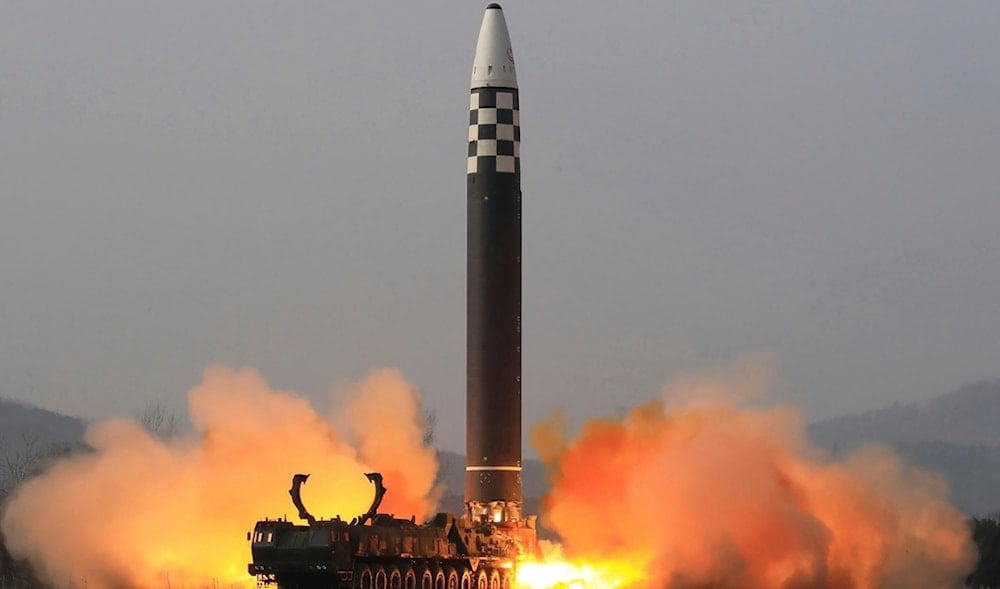DPRK test-fires one of 'newest, most powerful' ballistic missiles
The DPRK conducts a military launch of one of its most powerful ballistic missiles to boost its nuclear deterrent.
-

This photo distributed by the DPRK government shows what it says is a test-fire of a Hwasong-17 intercontinental ballistic missile (ICBM), at an undisclosed location in DPRK on March 24, 2022. (AP)
The DPRK test-fired one of its newest and most powerful missiles for the first time, only a week after leader Kim Jong Un inspected the nation's intercontinental ballistic missiles (ICBM) and announced plans to enhance the DPRK's war deterrence.
Last week, state media images showed Kim standing before large Hwasong-18 solid-fuel intercontinental ballistic missiles and medium- to long-range hypersonic missiles, which are difficult to intercept due to their irregular flight paths.
South Korea, just a day earlier, had claimed that the DPRK was planning on conducting another ICBM launch or even carrying out a nuclear test ahead of the United States elections, due November 5.
The ICBM test came hours after Washington and Seoul called on Pyongyang to withdraw its troops from Russia, claiming that the soldiers could be involved in possible action against Ukraine.
"The initial judgment so far is that (Pyongyang) may have test-fired a new solid-propelled long-range ballistic missile," South Korea's military reported, adding that the missile had flown a distance of about 1,000 kilometers upward.
Meanwhile, Japan confirmed that the missile was airborne for around 86 minutes and hit a 7,000-kilometer altitude, longer and higher than any previous launch by the DPRK.
Washington condemned the launch as a "clear breach of several UN Security Council resolutions," according to National Security Council spokesman Sean Savett.
In response, South Korea announced that Seoul, Washington, and Tokyo—important regional security partners—will conduct joint military exercises that include US strategic assets. South Korean President Yoon Suk Yeol stated that the country will implement new independent sanctions against the DPRK and collaborate with allies and the UN to address Pyongyang's repeated violations of Security Council resolutions.
Meanwhile, the Korean Central News Agency (KCNA) cited Kim Jong Un defending the country's military drills and development, saying it is "an appropriate military action that fully meets the purpose of informing the rivals... of our counteraction will."
Kim further asserted that the DPRK will continue enhancing its strategic missile capabilities and "will never change its line of bolstering up its nuclear forces."
Speculation over the DPRK's missile activity
Yang Moo-jin, president of the University of North Korean Studies in Seoul, suggested that the DPRK's recent missile launch may have been intended to distract from international criticism regarding its alleged troop deployment.
South Korea has accused the DPRK of supplying weapons to Russia amid its conflict with Ukraine and has noted a significant troop buildup following Kim Jong Un's defense agreement with Vladimir Putin. This deployment is viewed as a "significant security threat," with US Defense Secretary Lloyd Austin urging Pyongyang to withdraw its troops.
Yang pointed out that the missile's flight duration and altitude suggest the DPRK is testing whether a heavy multiple-warhead ICBM could reach the US mainland.
South Korea's military had warned that preparations for an ICBM-class missile launch were nearly complete, potentially testing atmospheric reentry technology.
In response to the situation, Seoul, a significant weapons exporter, is considering whether to send arms to Ukraine, a move it had previously avoided due to domestic policies against supplying weapons to active conflict zones.
Read more: Russia-DPRK cooperation not threat to South Korea security: Embassy

 3 Min Read
3 Min Read









